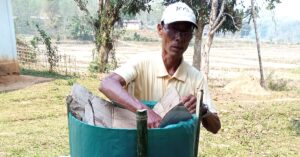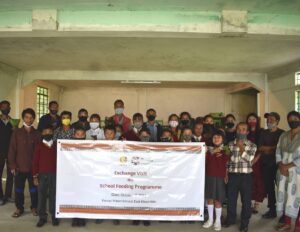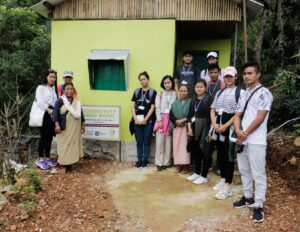Daribokgre is a small community in East Garo Hills, located close to Nokrek range, the highest peak in Garo Hills, Meghalaya. It is famous for its picturesque scenes and sweet oranges and can be aptly called as the land of citrus fruits. The citrus variety called Citrus indica locally known as Memang Narang has also earned the Geographical Indication tag in Nokrek region. Daribokgre is home to about 20 varieties of citrus fruits, both wild and domesticated.
The community is an active participating village of NESFAS and is currently taking part in the ongoing project, “Empowering Indigenous Communities through Agroecology Learning Circles (ALCs) for resilient, integrated and innovative natural resource management”, which is supported by MBMA and funded by the World Bank.
As citrus plantations are an important economic contributor for their livelihood, ALC members of this community conducted their ALC experiments on stem borer to save orange trees from being infected, and thus increasing fruit production. Relying on their traditionally learned knowledge, farmers used ground garlic and fern leaves made into a paste and deposited it in cavities formed by stem borer infestation.
To further aid in orange production, the community also engages in bee-keeping and 14 ALC farmers of a total of 15, are also bee-keepers. Bees are known to be the most important pollen carriers in the pollination of citurs fruits. The bees reared by the ALC farmers are of Apis cerana species, commonly known as bijakol in the local Garo language. While feeding on nectar of the flowers of orange plants, the bees carry pollen grains from one flower to another. Thus, this not only accelerates fruit production but also results in one of the finest quality honey in the state.
“We rear bees for honey and also because bees have been found to increase fruit production, and both of these are important sources of income for our livelihood,” said Sengte Marak, Community Facilitator of Daribokgre. The integration of bee-keeping and citrus production is a welcome move, now being adopted by the majority of the farmers.
The community also engages in shifting cultivation, while following age-old traditional rituals and practices that come with it. Each of the members have important roles to play in uplifiting the socio-economic status of their community. Besides farming, the tourism sector has also been booming and continues to grow in the community. It is one of the most visited sites in Garo Hills, flocking with local and international tourists. One can halt for a night or two in traditionally built home-stays and guest houses and have a taste of sweet local honey, or dose up on Vitamin C with different varieties of citrus fruits in the fruiting season.



